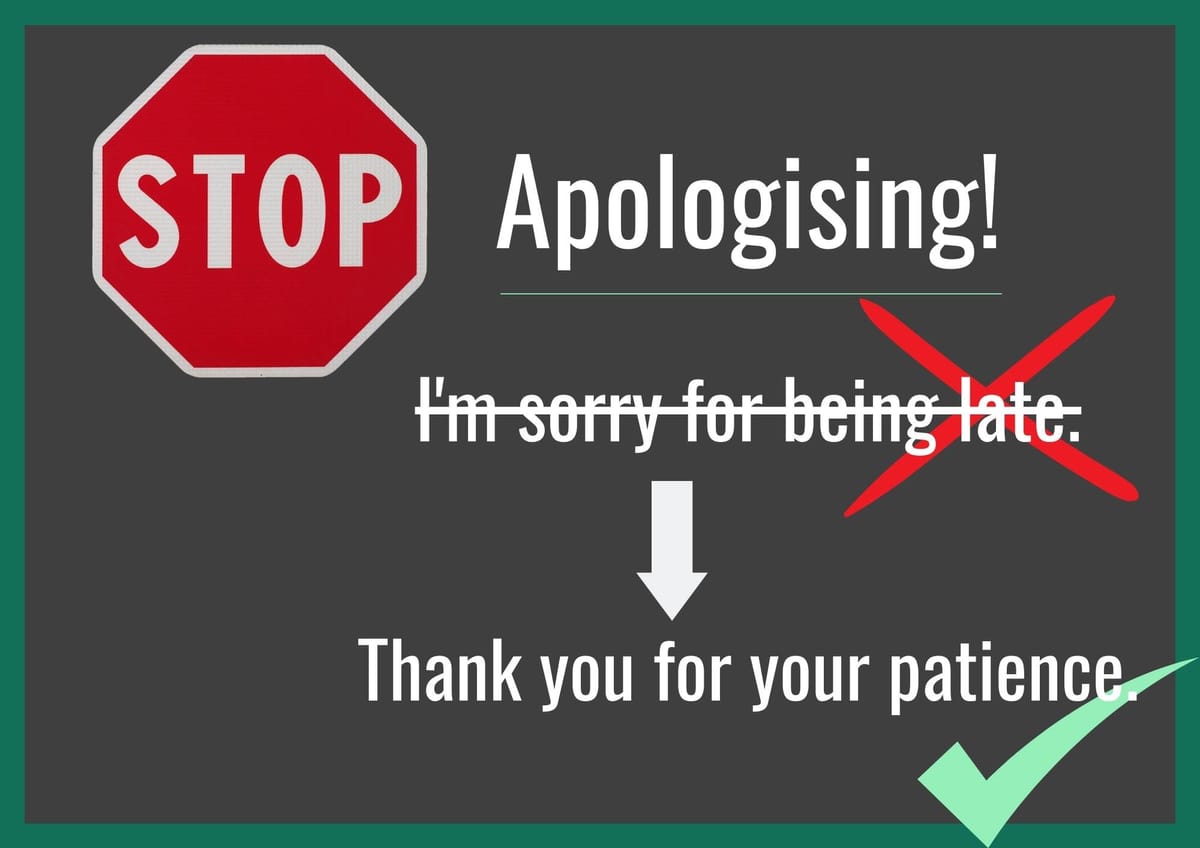Why Do I Keep Saying Sorry? Learning to Break the Apology Cycle.

Action: Reframe your daily interactions from deficit-based apologies and over-responsibility toward appreciative communication that builds trust and gratitude.
Content: Uncover why you keep saying sorry and implement practical examples to reframe your communication for better self-worth and credibility.
Outcome: Build trust and rapport in your relationships, encourage positive action, save yourself time and enhance your well-being.
Stop Apologising!
Are you a default apologiser?
I’m sorry I’m late. I’m sorry I made a mistake. I’m sorry I can’t come.
If profuse apologising is in your nature, you'll know how wearing it is.
Why? Prolific sorry-sayers tend to focus on their faults and deficiencies. They draw attention to their perceived shortcomings, the things they lack or believe they've done wrong.
Scholars of sorrow recite regrets, craft contrition, broadcast blunders and repeat remorse. A guilt guru's life is surely exhausting!
And, above all, it's unnecessary.
So, if you're a professor of pardons, it's time to update and lay guilt-ridden interactions to rest.

Instead of operating from a deficit-based communication model in your interactions (focusing on what you think you've done wrong), you can use this article to redirect your efforts to a gratitude outlook (offering thanks for people's understanding) in your interactions with others.
When you create opportunities to express appreciation, you'll craft a deeper sense of self-respect and enhance your reputation as a positive influence in the eyes of others.
Daily interactions will move from a sorry-slinging assault course to a boulevard of blessings.
Sound good? Let's dive in.
To begin, let's compare and contrast deficit and gratitude-based models of communication:
Communication models
Deficit-based Communication focuses on weaknesses, problems, or what is lacking in a situation or individual. This model emphasises errors, shortcomings, and areas of failure, leading to a negative outlook and interactions that can undermine confidence and self-worth.
Conversely, …
Gratitude-based Communication centres on appreciation, strengths, and positive aspects of a situation or individual. It emphasises expressing thanks and recognising contributions. An emphasis on appreciation fosters healthy relationships and sets a standard for acknowledging other people's contributions.
In short, sorry is swapped for thank you in acknowledging the contributions, and it feels much better.

To gauge where you fall between these two styles, consider these questions:
- Mistakes: Does your communication highlight your errors?
- Flaws: Do you dwell on shortcomings more than achievements?
- Standing: Are your frequent apologies diminishing your credibility?
- Obligation: Does your language make others feel guilty or burdened?
- Self-Worth: Do your words reduce how you feel about yourself?
- Limitation: Are you closing doors to constructive discussions?
The Dark Side of Sorry
Apologising, especially in excess, often diffuses tension and earns temporary approval or peace, reinforcing its use as a go-to strategy.
However, it also inadvertently reinforces a negative self-image and diminishes one’s perceived competence.
Frequent apologies for minor or non-issues dilute the meaning of a genuine apology and signal a lack of confidence, potentially undermining a person's authority and how they perceive and value themselves (self-esteem).
This pattern can lead to a cycle in which the individual feels increasingly unworthy or anxious about their actions. In turn, this hinders the development of more assertive and balanced communication skills.
Addressing this pattern involves recognising its origins and the assumptions that fuel it. We must challenge the long-held belief that one is always on the brink of causing upset and learn to evaluate situations more objectively.
Yet, breaking ingrained tendencies is challenging, especially if these inclinations are a longstanding component of our communication repertoire and emotional regulation.
For instance, those with an anxious attachment disposition might apologise more frequently due to fear of rejection or a deep-seated need to maintain connections at any cost. Acknowledging psychological (and emotional) factors can illuminate why apologies may feel necessary when not warranted.
The Sorry-Sayer's Assumptions
People tend to apologise too often when they shoulder more responsibility than necessary. Default apologising usually stems from a well-intentioned place of politeness, a desire to maintain harmony and avoid conflict, even when you're not at fault.
Another reason behind frequent apologies is the fear of disapproval. Some worry that standing firm or asserting themselves might lead to rejection or criticism, so they opt for an apology instead, seeing it as a safer way to navigate social or professional waters.
Moreover, there's a tendency to overestimate the impact of our actions on others, assuming that our mistakes or inconveniences have greatly troubled them.

This assumption can drive us to offer apologies as a form of reassurance, not just to the other person, but to ourselves, mitigating our own feelings of guilt or discomfort.
Lastly, self-esteem (how we value and perceive ourselves based on our opinions and beliefs about ourselves) plays a crucial role.
Individuals with lower self-esteem might find themselves apologising frequently, as they are more prone to believing they are at fault, even when not.
This is less about the reality of the situation and more about their perception of themselves in relation to others.
Addressing deficit-based communication is more than altering your speech patterns; it's about addressing the underlying beliefs and assumptions that fuel them.
So, where may the underlying causes of this habit reside? Unpacking a common cause of excess apologising can help us to address and dismantle the habit more effectively.
Why do I keep saying sorry?
While default apologising often stems from a well-intentioned instinct of politeness or conflict avoidance, the learned behaviour aspect of over-apologising frequently has roots laid in early life encounters with criticism and blame.
Formative experiences significantly impact self-image and the roles we adopt in interactions with others.
Understanding the Origins of Over-Apologising
If, as a child, you were burdened with guilt and an outsized responsibility for the moods and dispositions of significant adults (parents, older siblings, etc.), you may learn to internalise a belief that you are inherently at fault or that your actions will inevitably have negative consequences.
In such circumstances, apologies represent a shield to protect oneself and maintain safety—a means to pre-empt the sword of criticism or to temper a conflict a child has learned is their own fault. In these circumstances, each unwarranted apology reinforces a belief in their own inadequacy.
While adaptive in unpredictable or critical environments, this coping strategy can become a default mode of interaction, extending far beyond its original context.
The child, now an adult, might not realise they are over-apologising, as each unwarranted apology has reinforced a belief in their own shortcoming.
What began as a protective measure to manage an unsteady emotional environment now operates almost autonomously, triggered by a wide range of situations that bear a resemblance, however slight, to those early experiences of criticism or blame.
Alex's story
Alex grew up in a household where emotional expression was frequently met with criticism. From a young age, Alex learned that saying "I'm sorry" was the quickest way to smooth over tensions, especially when she sensed disapproval from her parents for actions as innocent as spilling water or not finishing homework on time.

This ongoing impulse to apologise for minor mishaps taught Alex to preemptively shoulder blame, a habit that plagued her into adulthood.
In professional settings, Alex frequently apologised for factors beyond her control, such as delays caused by others or when voicing a diverging opinion. This behaviour, initially a survival strategy in a critical home environment, became a barrier to asserting herself and fostering genuine, reciprocal relationships.
It wasn't until Alex recognised the root of her constant apologies—a deep-seated belief instilled in childhood that she was always a step away from doing something wrong—that she began the journey of self-awareness.
By actively challenging this ingrained behaviour and its underlying assumptions, Alex started to cultivate a more balanced approach to communication, learning to express herself without defaulting to an apology.
From Deficit to Gratitude: Saying goodbye to sorry!
We've reviewed the origins, beliefs, and habits that fuel deficit-based communication. Now, consider some practical examples of gratitude or appreciative interactions and why they work.
From: I apologise for the inconvenience, to Thank you for your understanding.
Why? By shifting focus from the problem to the other person's positive action, you acknowledge their understanding rather than concentrating on the inconvenience.

From: Sorry I keep asking questions, to I appreciate your guidance.
Why? From giving the impression that you feel burdensome to expressing gratitude for the guidance and the chance to learn.
From: I regret that I can't attend, to Thank you for the invite; I value our relationship.
Why? The original statement focuses on absence, while the reframe acknowledges the importance of the relationship and expresses gratitude for the invitation.
From: I'm sorry I'm late to Thank you for waiting for me.
Why? Being late could be seen as a failure to manage time, but thanking someone for waiting turns the focus on their patience and understanding.
From: Sorry, can you explain that again? to Thank you for highlighting that; could you elaborate a bit more?
Why? This approach not only positions you as engaged and proactive but also fosters an environment where seeking understanding is positively reinforced
From: I apologise for the oversight to Thank you for bringing this to my attention.
Why? The reframe moves away from the negative aspect of an oversight and towards the constructive action of the other person in bringing the matter to your attention.
Final thoughts - 'Sorry' In It's Rightful Place
Advocating for a shift from chronic apologies to a gratitude-focused communication style is not to undermine the value of a sincere apology in certain situations.
Genuine apologies have their rightful place, especially when our actions have inadvertently hurt someone or caused inconvenience.
For example, if you miss an important deadline that impacts a team project, a heartfelt apology acknowledges the significance of the mishap and your responsibility in the matter. This approach demonstrates accountability and strengthens trust and respect within relationships.
At the same time, shifting from frequent apologies to a focus on gratitude significantly upgrades how we communicate.
It's about moving away from highlighting our own perceived faults and towards recognising and appreciating the patience and understanding of others.
This transition doesn't just alter our interactions; it fundamentally changes how we engage with the world and view ourselves.

Adopting a gratitude-based approach improves our relationships and self-perception. Each expression of thanks reinforces our positive connections with others and builds our self-respect.
Over time, what begins as a mindful adjustment in our communication can lead to a deeper appreciation for those around us and a more balanced self-view.
Let's replace the unnecessary apologies with genuine appreciation. In doing so, we will communicate more effectively and contribute to a more affirming and respectful interaction dynamic.
Embracing a gratitude-based model in your daily interactions is a practical step toward enhancing your well-being and the quality of your relationships.
As you move forward, I challenge you to catch yourself in moments of unnecessary apology and consciously choose gratitude instead. Reflect on the changes you observe in yourself and your interactions.
Adopting this shift is not just about altering your speech; it's about transforming your mindset and, ultimately, the connections with those around you. Your journey from apology to appreciation starts with a single, sincere thank you.
So, thank you for your patience in reading this article. I appreciate your time.